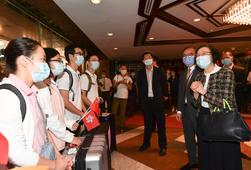 Hong Kong Secretary for Food and Health Sophia Chan Siu-chee (second from right) and Secretary for Constitutional and Mainland Affairs Erick Tsang Kwok-wai (third from right), on behalf of the Hong Kong Special Administrative Region government, see off the members of the mainland nucleic acid test support team at the team’s hotel, and repeat their gratitude for the central government’s support. (PHOTO PROVIDED TO CHINA DAILY)
Hong Kong Secretary for Food and Health Sophia Chan Siu-chee (second from right) and Secretary for Constitutional and Mainland Affairs Erick Tsang Kwok-wai (third from right), on behalf of the Hong Kong Special Administrative Region government, see off the members of the mainland nucleic acid test support team at the team’s hotel, and repeat their gratitude for the central government’s support. (PHOTO PROVIDED TO CHINA DAILY)
Hong Kong’s public was warned on Wednesday not to let down its guard with social distancing measuring easing as the city bade farewell to Chinese mainland medical experts after the end of the COVID-19 mass testing program.
The warning against a possible rebound brought about by the return of large crowds and social gatherings came from a respiratory medicine expert and a lawmaker, who said the mass testing showed that virus carriers can slip under public hospitals’ radar and spread the virus in places lacking social distancing.
Leung Chi-chiu, chairman of the advisory committee on communicable diseases of the Hong Kong Medical Association, pointed out that some new patients who developed COVID-19 symptoms had gone to see doctors before being confirmed as infected in the mass testing program. But they did not take the test at hospitals or clinics, reflecting a loophole in the current routine testing system, he said.
The warning came from a respiratory medicine expert and a lawmaker, who said the mass testing showed that virus carriers can slip under public hospitals’ radar and spread the virus in places lacking social distancing
Testing should be more accessible in terms of location and cost, allowing patients to learn their status as quickly as possible, just like in the voluntary mass testing program, Leung said.
A total of 1.78 million residents, about a quarter of Hong Kong’s population, took part in the 14-day free Universal Community Testing Programme, providing samples at 141 testing centers across the city. At least 42 cases of infection were detected in the program, including 13 asymptomatic patients.
ALSO READ: Lam hails joint efforts behind success of mass virus testing
Leung is concerned that the public will think the outbreak is under control given the low positive rate of detections in the mass testing program, followed by two consecutive days without any new locally transmitted cases of unknown sources in the city.
Hong Kong recorded nine cases of COVID-19 infections on Wednesday, either imported from overseas or related to earlier cases. The overall tally stood at 4,984.
Saying he understood local residents’ eagerness to take a break from the restrictions, Leung reminded the public to be “moderate” in resuming outdoor social activities. “It makes a huge difference to the risk of contracting and spreading the virus in public if people going to public places (do so) every day, instead of going out occasionally,” he said.
Leung stressed the importance of personal hygiene and wearing face masks, as most infection clusters detected in mass testing were related to a family and restaurants where masks were usually removed.
Lo Wai-kwok, a lawmaker and chairman of the Business and Professionals Alliance for Hong Kong, said it was good news for the city that the universal testing program revealed a relatively low positive rate.
If Hong Kong is able to provide adequate routine testing on its own and get further control over the pandemic, Lo said, it would be good timing for a step toward enhancing recognition of the need for a health certificate between Hong Kong and other parts of the world.
From there, a digital health code system and “tourism bubbles” could be introduced, to resume the exchange between Hong Kong and other places around the world, Lo said.
Also on Wednesday, after completing their mission of speeding the city’s nucleic acid testing under the program, the 579-strong medical support team returned to the mainland, where they will be quarantined for 14 days.
READ MORE: HK residents give warm farewell to mainland support team
These measures were necessary for Hong Kong to strengthen its healthcare capability, Leung said. If there were another outbreak and an infection rate as high as in early July, the public hospital system would come under enormous pressure within a short time.


